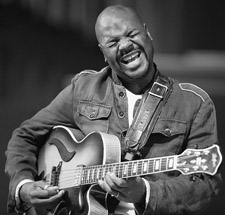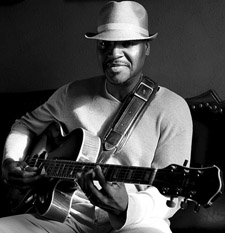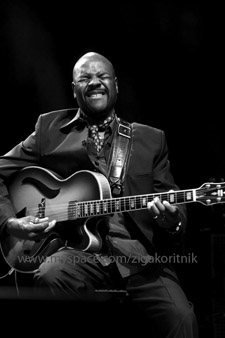Bobby Broom
Bobby Broom was born in Harlem on January 18, 1961, and raised on Manhattan’s Upper West Side. His birth name is Robert Broom, Jr. He is an American jazz guitarist, composer and educator.
Broom was playing onstage at the Billie Holiday Theatre with a group of teenage musicians in Young, Gifted, and Broke, a musical by Weldon Irvine (lyricist of the classic To Be Young, Gifted, and Black), when he was approached by Aurell Ray. Although Ray was Rollins’ guitar player at the time, he recommended Broom to the saxophonist and arranged for him to participate in a rehearsal with Rollins, bassist Bob Cranshaw, and drummer Eddie Moore.
Following the rehearsal, Rollins offered to take Broom on tour with the band. Broom declined the offer, explaining that he was still a senior in high school. “I’ll call you when I come back to New York,” Broom remembers Rollins telling him. The saxophonist did, and Broom found himself playing a one-night concert at Carnegie Hall in 1977 with Rollins, Cranshaw, Moore, Ray, pianist Mike Nock, and trumpeter Donald Byrd. Rollins called again in 1981 and took Broom on the road for six years. He rejoined Rollins in 2005 and remains a member of his group. He can be heard on the Rollins albums No Problem (Milestone, 1981), Reel Life (Milestone, 1983), Sonny, Please (Doxy, 2006), and Road Shows, vol. 1 (Doxy, 2008), plus the 2008 Doxy DVD release Sonny Rollins in Vienne.
Broom almost was the first and only guitar player ever to become a member of Art Blakey and the Jazz Messengers. He and trumpeter Wynton Marsalis had been sitting in with the drummer’s band at Mikell’s on 97th Street in New York City. Blakey asked both teenagers to join his group. Marsalis accepted. Broom passed. “I wasn’t really aware of the potential significance of my playing with Blakey,” Broom admits.
Music education also has been a constant for Broom, who earned a B.A. in music from Columbia College and an M.A. in jazz pedagogy from Northwestern University. He has taught at the University of Hartford, the American Conservatory of Music, Roosevelt University, and DePaul University. For the past decade, he has instructed music students in public high schools throughout Chicago as part of a jazz mentoring program sponsored by the Ravinia Festival Organization. One of his students from the program is now attending Juilliard. Broom, who says he “has a reputation for being strict about fundamentals,” is a sought-after private instructor.
Playing with Dr. John and then with Chris Foreman in the Deep Blue Organ Trio put Broom back in touch with the blues roots of jazz that he feels he had neglected early in his career. “I kind of dismissed the blues after I became a ‘jazz student,’ thinking that it was somehow beneath jazz intellectually,”he says. “I know now that the intellect can operate within different formats and that the vocabulary of the blues is as rich and deep as a person is willing to make it. To play fluently and authentically in either style, the blues or jazz, one has to devote a precious lifetime.
“Delving into Thelonious Monk also has been a way to connect with my musical heritage,” says Broom. With Bobby Broom Plays for Monk, he, Dennis Carroll, and Kobie Watkins make that connection, providing fresh insights into Monk’s music while capturing its timeless spirit.

